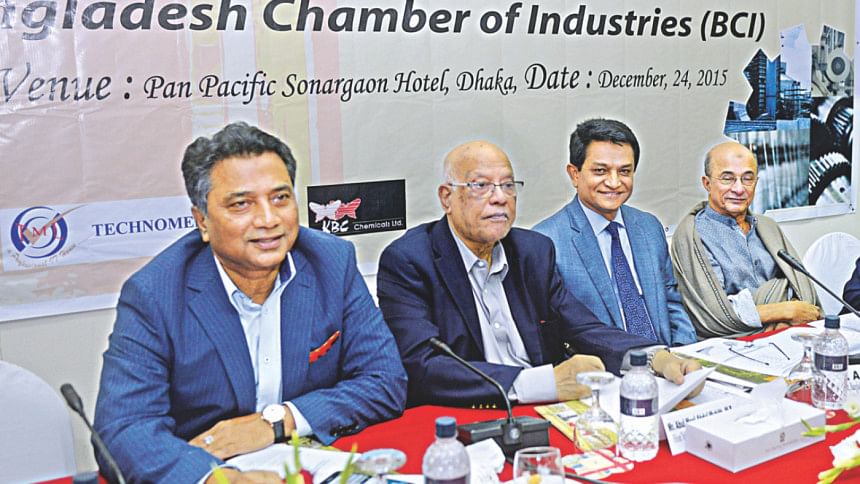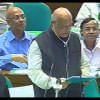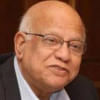Two top policymakers pledge to fix energy problems in two years

The finance minister and the prime minister's energy adviser yesterday assured the business community of reliable and quality power supply to all industrial units within the next two years.
By that time, all possible alternatives will be made available to ensure gas supply to factories, said the government's two influential policymakers at a discussion on the prospects and challenges of investment in Bangladesh.
“In two years' time, there will be no restriction on any industry for using power and energy,” Finance Minister AMA Muhith said at the discussion organised by Bangladesh Chamber of Industries at the capital's Sonargaon Hotel. “So, power and energy will not remain a problem for you.”
Citing the existing power supply of around 8,500mw per day, he said the capacity will hit 20,000mw by 2018. “But we have to improve the transmission systems,” he said.
Wherever the industrial parks will be set up, power supply will be ensured, Muhith said, adding that the government is thinking of setting up effluent treatment plants at the industrial units. The entrepreneurs will pay a charge for facility.
Prime Minister's Energy Adviser Tawfiq-e-Elahi Chowdhury said: “Give me one and a half years, and you will get uninterrupted power supply.”
He also pledged to fix the gas crisis within the next two years.
“We are working on importing LNG and the pipelines are being constructed. We need to set up a floating terminal and the primary works are also going on.”
The price will be Tk 7 per unit for using electricity generation and Tk 8 per unit for gas production, according to Chowdhury. However, the prices he quoted have not been finalised yet.
Besides, he said the government has decided to explore 10 wells for new gas. Echoing the energy adviser, Muhith said: “We shall not make our development plan based on our stock of gas. So, we have decided that we are getting into the international trade of gas.”
About the business community's demand for fuel price adjustments in line with the international market price, Muhith said the government is yet to think about it. “But it is true that the international fuel price is on a declining trend right now.” If the fuel price stabilises at a certain level in the international market, then the price may be adjusted locally, Muhith said.
Chowdhury said the government does not want to constantly adjust the fuel price; rather, it wants to keep it at a sustainable level. Earlier, almost all the business leaders called for diesel price cuts such that they can use the fuel for alternative power generation.
Latifur Rahman, former president of the Metropolitan Chamber of Commerce and Industry, said the international oil price has come down to below $40 per barrel, but the consumers are paying the fuel price on the $100 base.
The benefit is coming to the government and not the consumers, he added. Abdul Hai Sarkar, former president of Bangladesh Textile Mills Association, said they are ready to face and overcome any barrier; they only need uninterrupted and quality supplies of gas and electricity.
“We have man and machinery and we are ready to make investment. But we need smooth supply of power and energy.”
Dhaka North City Corporation Mayor Annisul Huq, who is also a former president of the Bangladesh Knitwear Manufacturers and Exporters Association, urged the government to provide a “roadmap” on energy and power by articulating when, how and where it can ensure smooth supply.
The entrepreneurs will take investment decisions based on the roadmap, he said. Newspaper Owners' Association of Bangladesh President Matiur Rahman praised the government for declaring newspapers as an industry last year.
Although the media belongs to the private sector, the government fixes the wages and other benefits for the employees in the sector, he said.
Rahman, also the editor of Prothom Alo, the most-circulated newspaper, highlighted some of the problems the media industry is facing: the 20 percent duty on imports of newsprint, for example, is comparatively high.
He said some government agencies such as the LGRD, roads and highways department and the communication ministry make undue and lengthy delays in paying the advertisement bills. Ardashir Kabir, chairman of Bangladesh Tea Association, urged the government to impose tariffs on tea import to help the domestic industry.
The prices of gas and electricity prices increased, so did the cost of production, he added. BCI President AK Azad moderated the discussion.

 For all latest news, follow The Daily Star's Google News channel.
For all latest news, follow The Daily Star's Google News channel. 








Comments